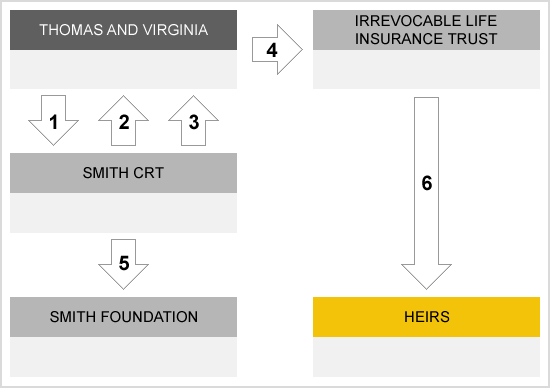 |

|
Thomas and Virginia contribute $2 million of highly appreciated marketable securities to a Charitable Remainder Trust. |
|
For their contribution, the Smiths receive an income tax deduction of $562,880. |
|
The Smiths receive an annual distribution of 7%, or $140,000 from the trust. |
|
The Smiths establish an ILIT and instruct the trustee to purchase a $2.4 million policy on their lives. The Smiths have sufficient cash flow from the CRT to make annual gifts to the ILIT to fund the policy. |
|
Upon the death of Thomas and Virginia, the remaining trust corpus passes to the Smith Foundation. |
|
At the same time, proceeds from the $2.4 million insurance policy pass estate-tax free to Thomas and Virginia's heirs. |
TAX CONSIDERATIONS:
- Your gift entitles you to a federal income tax deduction. Your deduction depends on the value of your gift, your age (or the number of years the trust will pay income), the payout rate and an interest rate the government publishes each month. The higher the payout rate, the lower your deduction. Older donors get a larger deduction than younger ones.
- You deduction in any given year cannot be more than 50% of your adjusted gross income (30% if you give appreciated property). The IRS allows a five-year carryover for unused deductions.
- The trust must pass several tests to qualify as a charitable trust. These tests, using how long the trust will pay income and the payout rate, try to make sure that after paying the income, the charity gets at least 10% of what you put into the trust. If the trust will pay income for life, the younger you are, the lower your payout rate must be to pass the tests.
- Income from the CRT is taxed according to how the trust received that income. It is first taxed as ordinary income to the extent the trust earned ordinary income; then, capital gains to the extent the trust had capital gains; then, undistributed income from earlier years; and, finally, tax-free return of basis.
- If the trust pays you more than it earned as ordinary income that year, you may have to “recapture” capital gains the trust had when it sold appreciated property. This allows you to spread any income tax liability – both ordinary income and capital gains – over future years.
- There is no federal gift tax when you give property to the trust.
- If you are the only person with income from the trust, your estate takes a charitable deduction for 100% of the trust’s value. If your spouse also receives income, his or her income interest may qualify for the unlimited marital deduction. If someone else will receive income after you die, your family pays an estate tax on the value of his or her income and takes a charitable deduction for the rest of the trust’s value.
- If you arrange your wealth replacement trust properly or have adult children own the life insurance, your family will not pay estate tax on it. When you die, the life insurance can replace what your family “loses” because of your charitable gift. It can also provide cash to pay estate expenses and create a legacy for your family.
|

